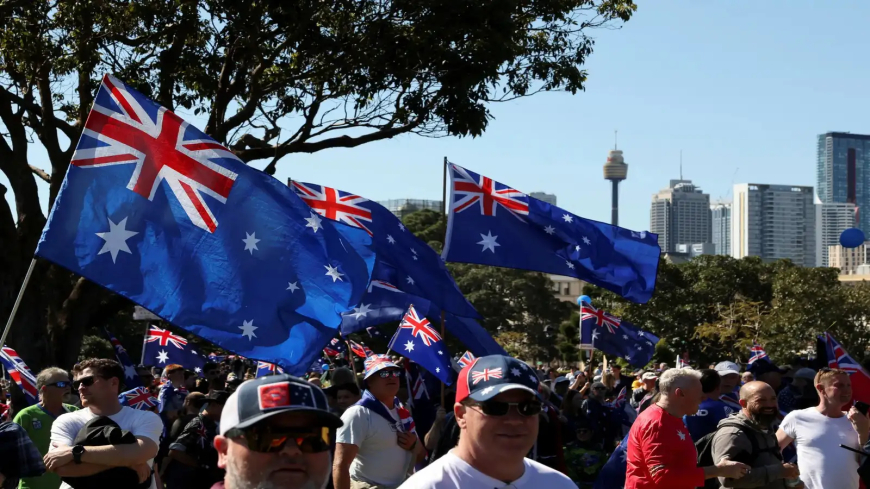“March for Australia” Protests Turn Violent: Neo-Nazis Amplify Anti-Immigration Sentiment as Canberra Moves to Crack Down
Australia’s “March for Australia” rallies turned violent as neo-Nazi groups infiltrated anti-immigration protests. The government condemned hate speech, promised stronger crackdowns, and police made arrests across major cities.

On 31 August 2025, Australia witnessed a wave of coordinated anti-immigration rallies—branded the “March for Australia”—in every capital city and many regional centres, drawing more than 45,000 participants nationwide, with an estimated 5,000–8,000 in Sydney alone WikipediaReuters+1. While framed by some organisers as a grassroots pushback against population pressures, the events revealed darker undercurrents: involvement of extremist groups, violent clashes, and a striking governmental response.
Extremism in the March: Quiet Agenda, Loud Messages
Although organisers—under the pseudonym Bec Freedom—insisted the protests were not far-right ABCWikipedia, an ABC News Verify probe uncovered earlier references on the rally’s website to “remigration,” a white-nationalist concept tied to forced deportation of non-European communitiesABC. Prominent far-right influencers, including Hugo Lennon and “Baylie Bergroth” ("BoilingaBilly" online), promoted extremist ideas such as the "Great Replacement" conspiracy and openly shared pro-Nazi content ABCWikipedia.
Further confirmation came via the National Socialist Network (NSN): neo-Nazi leader Thomas Sewell appeared as a keynote speaker in Melbourne, declaring ominously, “If we do not stop immigration, then our death is certain,” and boasting "his men" had led sections of the march The GuardianWikipedia. Community leaders noted neo-Nazi speakers across several events, using slogans like “hail White Australia” ABC.
Flashpoint Cities: When Protest Becomes Chaos
Sydney
Around 5,000–8,000 protestors marched near the Sydney Marathon route. Police despatched hundreds of officers, including riot and mounted units, and ended the day reporting “no significant incidents”, though one woman was arrested for breaching the peace Reuters+1ABC. A counter-rally by the Refugee Action Coalition offered defiant resistance to the far-right messaging Reuters+1.
Melbourne
Tensions erupted into violence: marchers clashed physically with counter-protesters (notably pro-Palestinian activists), prompting police to deploy pepper spray, concussion grenades, and even mounted units to separate warring groups Courier MailDaily TelegraphABCThe GuardianReuters. Six arrests were recorded for offenses ranging from assault to resisting police The Guardian+1News.com.au.
Brisbane, Adelaide, and Beyond
In Brisbane, chanting slogans like “send them home” and “Aussie nation, stop the invasion,” protestors met counter-demonstrators advocating for inclusivity Courier Mail. Adelaide saw smaller numbers but heightened tension and several arrests The GuardianCourier Mail.
Government Response: Condemnation, Laws, and Legislative Moves
Prime Minister Anthony Albanese’s Labor government outright condemned the rallies as “spreading hate” and undermining social unity Reuters+1The Guardian. Home Affairs Minister Tony Burke and Multi-cultural Affairs Minister Anne Aly denounced the involvement of extremist groups and reaffirmed Australia’s inclusive values The Guardian.
Australia’s legal framework is already marked by explicit bans on Nazi symbols and salutes, enacted at federal and state levels. A law passed in early 2024 criminalises display or sale of Nazi symbols and was activated on 8 January 2024, carrying sentences up to a year in prison WikipediaReuters.
Some states are also proposing or have passed laws against hate speech near places of worship and protecting religious communities—Victoria, for instance, is working on safe-zone legislation around sacred sites AP News, while New South Wales enacted hate-speech and antisemitism laws with review provisions Daily Telegraph.
Everyday Australians Respond via Social Media
Across platforms like X/Twitter and TikTok, users shared footage and first-hand accounts—some supported the march, while many others denounced it. One viral TikTok by user “Deeds23” generated concern after seeming to threaten violence; Victoria Police launched an investigation News.com.au. Activists, including First Nations voices, shared poignant messages. In Brisbane, one Indigenous elder famously reminded marchers: “You invaded this country, you stole the land” The Guardian. On the other side, migrant communities expressed trauma—some likened the rallies to echoes of the old White Australia policy ABC.
Table: “March for Australia” vs. Past Rallies
| Rally/Event | Year | Scale / Scope | Extremist Involvement | Government / Police Response |
|---|---|---|---|---|
| March for Australia | 31 Aug 2025 | ~45,000 across cities | Neo-Nazi speakers present; white-supremacist messaging | Widespread condemnation; existing Nazi-symbol bans invoked; arrests; police intervened with pepper spray, mounted units |
| Adelaide NSN protest | Jan 2025 | ~40 marchers in Adelaide CBD | NSN-led, chanting “Australia for the white man” | 16 arrested; Prime Minister condemned; police action in place |
| Masked NSN march in Melbourne CBD | 9 Aug 2025 | ~100 masked neo-Nazis | Explicit extremist display | Arrests made; Premier called for unmasking powers; denounced strongly |
Conclusion: Multiculturalism at a Crossroads
The “March for Australia” rallies on August 31, 2025, have unmasked deep rifts in Australian society: simmering fears about housing and migration intersecting dangerously with extremist ideologies. Government condemnation and existing legislation provided tools to respond—but the events also underline a societal challenge: how to distinguish between legitimate debate on immigration and the exploitation of dissent by hate groups.
In the aftermath, policymakers must navigate carefully: strengthening legal safeguards without stifling democratic expression, and amplifying community voices that resist fringe co-optation. Social media’s role—holding actors accountable and preserving collective memory—will be crucial. As Australia reevaluates its identity amid rising global friction, the fight for its inclusive ideals continues.
What's Your Reaction?
 Like
0
Like
0
 Dislike
0
Dislike
0
 Love
0
Love
0
 Funny
0
Funny
0
 Angry
0
Angry
0
 Sad
0
Sad
0
 Wow
0
Wow
0






































































